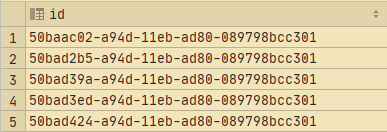

- #Mysql uuid auto generate install#
- #Mysql uuid auto generate update#
- #Mysql uuid auto generate Offline#
- #Mysql uuid auto generate mac#
A UUID is considered valid if it contains 32 hexadecimal characters with optional separators: The other function IS_UUID does a very basic validation of the UUID provided as parameter and returns TRUE if the argument is a valid UUID and FALSE otherwise. Setting the argument to true while inserting the values: “INSERT INTO t VALUES(UUID_TO_BIN(UUID(), true)) ” will rearrange the time-related bits so that consecutive generated values will be ordered.įor more information about the problem and solution for previous versions of MySQL check this link. The UUID_TO_BIN/BIN_TO_UUID functions have a second boolean argument, which is optional, and can be used to avoid this problem. This will have a significant performance impact, since the values will be inserted in random locations in the index tree which will require a lot of IO when the index tree will not fit in memory anymore.

#Mysql uuid auto generate mac#
You can observe in the results above that the values most likely to be different on consecutively generated UUIDs are the ones at the beginning of the string, that is because the smaller time units are the hexadecimals characters at the beginning of the string, while the larger time units come next, ending with the MAC address. That means compressing the 32 characters (36 or more with separators) to the 16-bit format or back to the human-readable format. These function will be used to convert from the human-readable format (char/varchar) to the compact format (binary) and back. Let’s start with the pair: UUID_TO_BIN/BIN_TO_UUID. These will ease the work with UUIDs and will provide a solution around the issues mentioned above. With these problems in mind, we added three new functions: UUID_TO_BIN, BIN_TO_UUID, IS_UUID. – performance issues: mainly because of the size and not being ordered You can retrieve the UUID of the inserted record by using the RETURNING clause. You can use the randomuuid function to generate a globally unique identity during the record insertion. Consider the multi-region tables where the identity columns are unique to a single region.
#Mysql uuid auto generate Offline#
– can be generated offline (without any exchange of information with the database or collaboration with other components of the system)īut they also come with some disadvantages: The randomuuid function generates a random but unique 36-byte string. – are hard(er) to guess (example from an URL) – the keys are unique across tables, databases and servers UUIDs are a good alternative to AUTO_INCREMENT PRIMARY KEY and are used mainly because: The one that MySQL implements in the UUID() function is version 1 which is composed of the timestamp, UUID version and MAC address. Run the migrations: After the config and migration have been published and configured, you can create the tables for this package by running: php artisan migrateĪdd the necessary trait to your User model: // The User model requires this trait use HasRoles Ĭonsult the Basic Usage section of the docs to get started using the features of this package.UUIDs can have different underlying structure depending on the version. If you've been caching configurations locally, clear your config cache with either of these commands: php artisan optimize : clear # or php artisan config : clear Generally it's bad practice to do config-caching in a development environment. This package requires access to the permission config. NOTE: If you are using MySQL 8, look at the migration files for notes about MySQL 8 to set/limit the index key length, and edit accordingly.Ĭlear your config cache.
#Mysql uuid auto generate update#
If you are going to use the TEAMS features, you must update your config/permission.php config file and set 'teams' => true, and in your database if you want to use a custom foreign key for teams you must change team_foreign_key. It also mentions important considerations after extending this package's models for UUID capability. It explains some changes you may want to make to the migrations and config file before continuing.

NOTE: If you are using UUIDs, see the Advanced section of the docs on UUID steps, before you continue. You should publish the migration and the config/permission.php config file with: php artisan vendor : publish - provider = "Spatie\Permission\PermissionServiceProvider"

Or you may manually add the service provider in your config/app.php file: 'providers' => Optional: The service provider will automatically get registered.
#Mysql uuid auto generate install#
You can install the package via composer: composer require spatie / laravel - permission If you already have a file by that name, you must rename or remove it. This package publishes a config/permission.php file. Package VersionĬonsult the Prerequisites page for important considerations regarding your User models! This package can be used with Laravel 6.0 or higher.


 0 kommentar(er)
0 kommentar(er)
